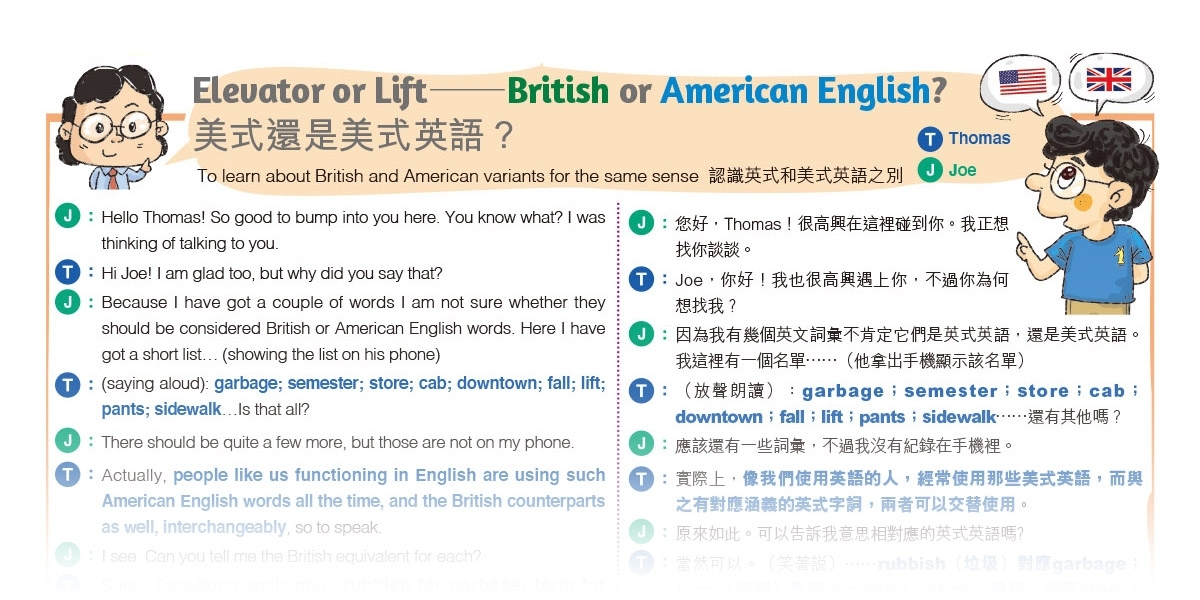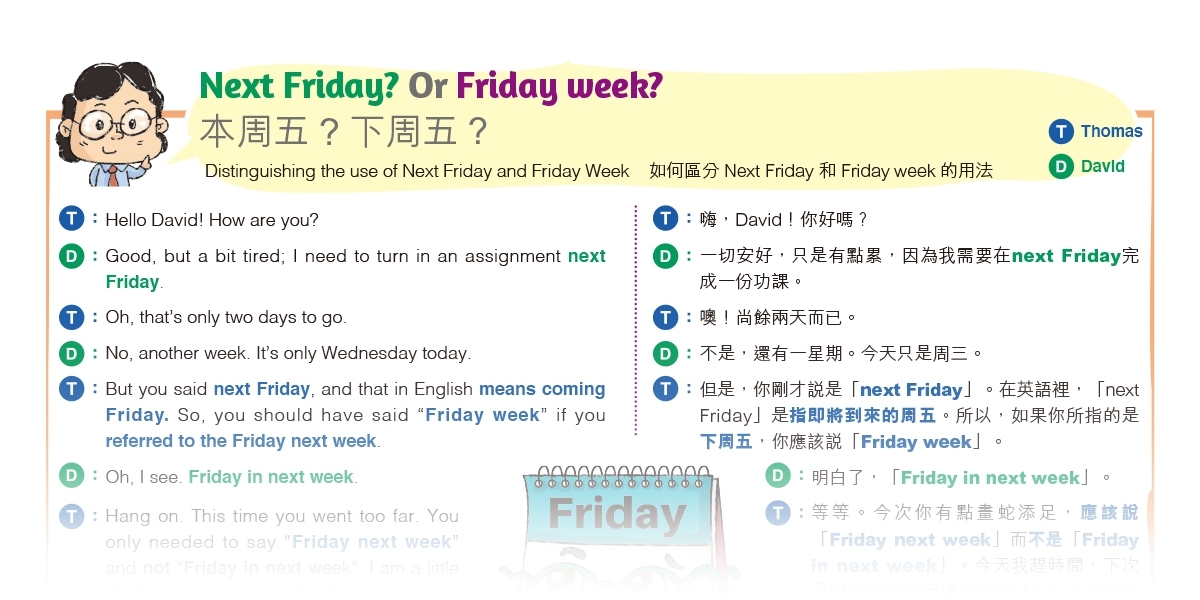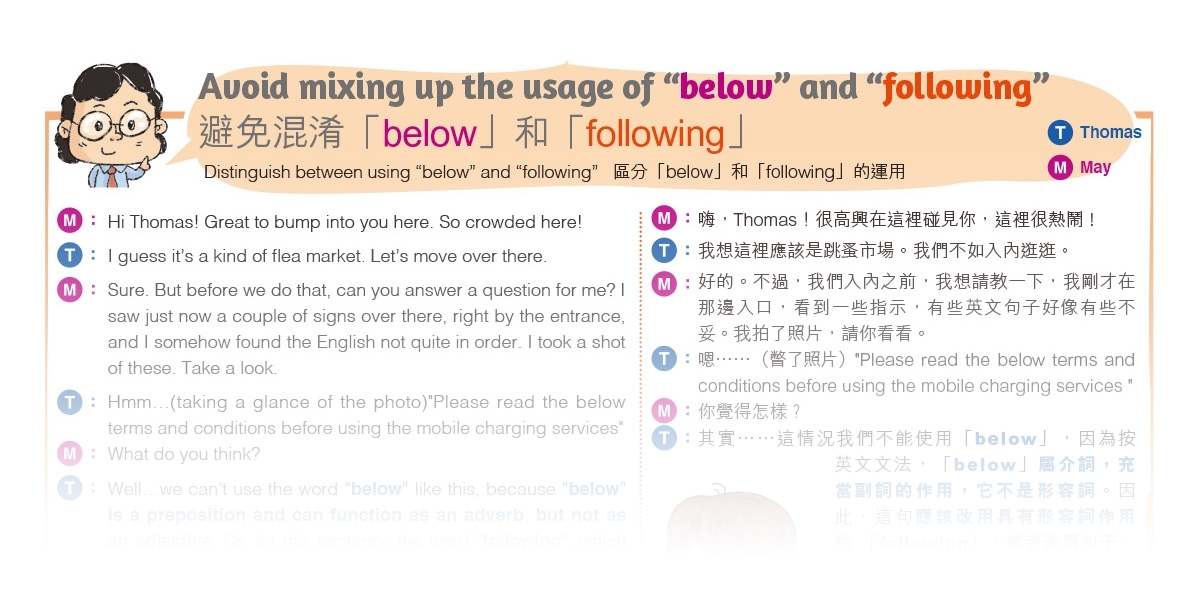昔日文章


Learning English with Thomas
2022.11.27
Elevator or Lift —— British or American English?
美式還是美式英語?
To learn about British and American variants for the same sense 認識英式和美式英語之別
T : Thomas J : Joe
J : Hello Thomas! So good to bump into you here. You know what? I was thinking of talking to you.
T : Hi Joe! I am glad too, but why did you say that?
J : Because I have got a couple of words I am not sure whether they should be considered British or American English words. Here I have got a short list… (showing the list on his phone)
T : (saying aloud): garbage; semester; store; cab; downtown; fall; lift; pants; sidewalk…Is that all?
J : There should be quite a few more, but those are not on my phone.
T : Actually, people like us functioning in English are using such American English words all the time, and the British counterparts as well, interchangeably, so to speak.
J : I see. Can you tell me the British equivalent for each?
T : Sure…(speaking smilingly)…rubbish for garbage; term for semester; shop for store; taxi for cab; town centre for downtown; autumn for fall; elevator for lift; trousers for pants; and pavement for sidewalk.
J : That’s another lesson for me today. Shall we go for lunch together?
J : 您好,Thomas!很高興在這裡碰到你。我正想找你談談。
T : Joe,你好!我也很高興遇上你,不過你為何想找我?
J : 因為我有幾個英文詞彙不肯定它們是英式英語,還是美式英語。我這裡有一個名單……(他拿出手機顯示該名單)
T :(放聲朗讀):garbage;semester;store;cab; downtown;fall;lift;pants;sidewalk……還有其他嗎?
J : 應該還有一些詞彙,不過我沒有紀錄在手機裡。
T : 實際上,像我們使用英語的人,經常使用那些美式英語,而與之有對應涵義的英式字詞,兩者可以交替使用。
J : 原來如此。可以告訴我意思相對應的英式英語嗎﹖
T : 當然可以。(笑著說)……rubbish(垃圾)對應garbage; term(學期)對應semester;shop(商店)對應store; taxi(計程車)對應cab;town centre(市中心)對應downtown;autumn(秋天)對應fall;elevator(升降機) 對應 lift;trousers(長褲)對應 pants;and pavement(行人路)對應 sidewalk.
J : 今天又上了一課。不如我們一起吃午餐?


Learning English with Thomas
2022.11.20
“Makes your home comes true” —— correct or not?
「Makes your home comes true」—— 是對,還是錯﹖
Correct use of the verb “make” with infinitives 正確使用英文動詞“Make”的不定式(infinitives)
T : Thomas t : Tony
T : Tony, morning! How are you doing lately?
t : Could be better.
T : You do sound troubled.
t : It’s only this crazy grammar making me fail in drill exercises all the time, especially using infinitives together with verbs like make, let, help, and so on. Can I show you a picture? Is the language there in this ad correct?
T : Ah, it reads “(something) Makes your home comes true”. It’s wrong grammatically, because when you use the verb make, like in this case, the other verb that comes after it must be an infinitive without “ to” and cannot be another main verb.
t : How should it be corrected?
T : It should be “(whatever that may be that) makes your home come true”. For one thing, there can only be one main verb in a sentence, so the other verb-like items must be either infinitives or participles.
t : Very clear now. Thanks so much!
T : 早晨,Tony!你近來好嗎?
t : 可以更好。
T : 聽起來你好像有煩惱。
t : 這些英文文法令我經常在作業練習中犯錯,尤其是使用動詞的不定式,如make、let、help等等。我想你幫我看看這圖片,相中的廣告的用語使用正確嗎?
T : 啊,上面寫著 「(某事)Makes your home comes true」。在語法上而言,這表達是錯誤的。因為當你使用動詞make時,它後面的另一個動詞必定是不定式,不能使用「to」,並且它不能充當另一個主要動詞。
t : 應該怎樣改寫﹖
T : 正確寫法應該是「makes your home come true」。 有一點必須謹記,英文句子中只能有一個主要動詞,因此在同一句子中貌似動詞的詞彙,必須以不定式(infinitives)或分詞(participles)形式出現。
t : 我現在很清楚了。感謝你的指導!


Learning English with Thomas
2022.11.13
Next Friday? Or Friday week?
本周五? 下周五?
Distinguishing the use of Next Friday and Friday Week 如何區分Next Friday 和 Friday week 的用法
T : Thomas D: David
T : Hello David! How are you?
D : Good, but a bit tired; I need to turn in an assignment next Friday.
T : Oh, that’s only two days to go.
D : No, another week. It’s only Wednesday today.
T : But you said next Friday, and that in English means coming Friday. So, you should have said “Friday week” if you referred to the Friday next week.
D : Oh, I see. Friday in next week.
T : Hang on. This time you went too far. You only needed to say “Friday next week” and not “Friday in next week”. I am a little short on time today, so I’ll talk with you more about how to use the preposition “in” to denote points of time and dates.
D : Righto, OK, and thanks again.
T : 嗨,David!你好嗎?
D : 一切安好,只是有點累,因為我需要在next Friday完成一份功課。
T : 噢!尚餘兩天而已。
D : 不是,還有一星期。今天只是周三。
T : 但是,你剛才說是「next Friday」。在英語裡,「next Friday」是指即將到來的周五。所以,如果你所指的是下周五,你應該說「Friday week」。
D : 明白了,「Friday in next week」。
T : 等等。今次你有點畫蛇添足, 應該說「Friday next week」而不是「Friday in next week」。今天我趕時間,下次再跟你談談如何運用介詞「in」去指示時間和日期。
D : 好的,再次感謝你。


Learning English with Thomas
2022.11.06
Avoid mixing up the usage of “below” and “following”
避免混淆「below」和「following」
Distinguish between using “below” and “following” 區分「below」和「following」的運用
T : Thomas. M : May
M : Hi Thomas! Great to bump into you here. So crowded here!
T : I guess it’s a kind of flea market. Let’s move over there.
M : Sure. But before we do that, can you answer a question for me? I saw just now a couple of signs over there, right by the entrance, and I somehow found the English not quite in order. I took a shot of these. Take a look.
T : Hmm…(taking a glance of the photo)"Please read the below terms and conditions before using the mobile charging services"
M : What do you think?
T : Well…we can’t use the word “below” like this, because “below” is a preposition and can function as an adverb, but not as an adjective. So, for this sentence the word “following”, which functions like an adjective, should have been used, or the sentence could be rewritten, for example: “Please read the terms and conditions as indicated below…”
M : Thank you, Teacher! You explained so well.
T : Time to move over there through the crowd. Are you ready?
M : 嗨,Thomas!很高興在這裡碰見你,這裡很熱鬧 !
T : 我想這裡應該是跳蚤市場。我們不如入內逛逛。
M : 好的。不過,我們入內之前,我想請教一下,我剛才在那邊入口,看到一些指示,有些英文句子好像有些不妥。我拍了照片,請你看看。
T : 嗯⋯⋯(瞥了照片)"Please read the below terms and conditions before using the mobile charging services "
M : 你覺得怎樣?
T : 其實⋯⋯這情況我們不能使用「below」,因為按英文文法,「below」屬介詞,充當副詞的作用,它不是形容詞。因此,這句應該改用具有形容詞作用的 「following」,或者改寫句子, 例如:「Please read the terms and conditions as indicated below⋯⋯」
M : 謝謝謝老師!你解釋得很好。
T : 是時候越過人群入內逛逛,你準備好好了沒有﹖


